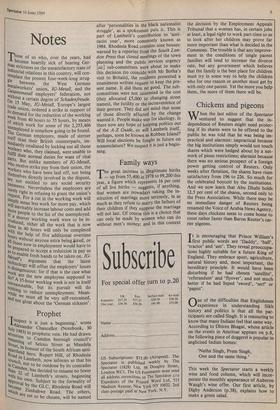Chickens and pigeons
When the last editor of the Spectator entured to suggest that the in- dependence of Reuters might need protec- ting if its shares were to be offered to the public he was told that he was being im- practical and alarmist: impractical because the big institutions simply would not touch shares which were hedged about by a net- work of pious restrictions; alarmist because there was no serious prospect of a foreign power getting control of Reuters. Only weeks after flotation, the shares have risen satisfactory from 196 to 226. So much for the celebrated boycott by the institutions. And we now learn that Abu Dhabi holds 12.5 per cent of the shares, second only to the Press Association. While there may be no immediate danger of Reuters being renamed the Voice of Arabia News Agency, these days chickens seem to come home to roost rather faster than Baron Reuter's car- rier pigeons.
It is encouraging that Prince William's first public words are 'Daddy', 'ball', `tractor' and 'ant'. They reveal preoccupa- tions highly suitable for a future King of England. They embrace sport, agriculture, natural history and, most important, the hereditary principle. It would have been disturbing if he had chosen 'satellite', `referendum' and 'flyover', and not much better if he had lisped 'sword', 'serf' or `papist'.
One of the difficulties that Englishmen experience in understanding Sikh history and politics is that all the par- ticipants are called Singh. It is reassuring to know that many Indians feel that same way. According to Dhiren Bhagat, whose article on the events in Amritsar appears on p.8, the following piece of doggerel is popular in anglicised Indian homes:
`Natha Singh, Prern Singh, One and the same thing.'












































 Previous page
Previous page